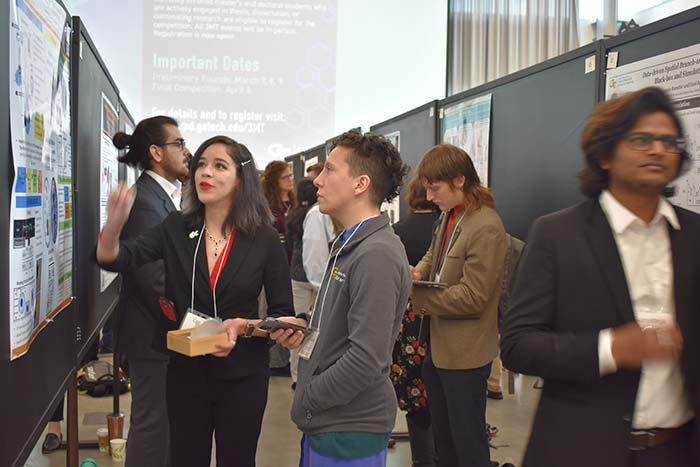
Sep 15, 2023
Updated: January 2026
“A few years ago, a poster revolution happened,” said Karena Nguyen, assistant director for Postdoctoral Services in the Office of Graduate and Postdoctoral Education.
This poster revolution, according to Nguyen, emphasizes the results of the research, which are featured prominently on the poster and take up most of the space. The objectives, methods, and discussion are displayed less prominently along the side of the poster, or a QR code takes the user to a website for more in-depth information.
“That tends to be effective because the poster presenter has thought about, ‘What’s the takeaway that I want people to walk away with,’ and they are usually the ones who practice their spiel,” said Nguyen. “Whereas some people with a traditional poster format get lost in the details, and you are stuck in a conversation for five minutes.”
As a grad student, Nguyen presented and won awards at numerous conferences for both poster and oral format. She also has experience judging posters, such as at Georgia Tech’s CRIDC. Nguyen provides her tips for streamlining your research for a poster competition.
Know your audience. “When somebody comes up to you, ask them what their level of expertise is,” said Nguyen. “Asking those questions at the beginning can help scale the level of detail that you want to get into and help streamline your message.”
Don’t tell too much on your poster. “What you want to avoid are long paragraphs,” said Nguyen. “That is a very common mistake; students will slap the research paper onto a poster. Streamline and simplify the message using bullet points.”
To keep your poster’s content streamlined, Nguyen recommends asking yourself the following questions:
- Do I have a clear objective for my research?
- Do I have clear results in easily readable figures with clear labels?
- Do I have a concise summary of the results?
- Do I have ideas on the impact of the work and plans for the future?
Provide a concise summary of the results. “Orally, what I’m looking for is if you can give me a 30 to 60-second overview of what you did,” said Nguyen. “If I have additional questions, are you able to answer those more in-depth?”
Narrow in on your findings. “Oftentimes, grad students want to showcase the entire breadth of work that they have done, which is a lot,” said Nguyen. “Narrow in on one to three key findings for a certain experiment or project. You can always talk about what else you found. Squeezing in too much information can confuse what a judge or participant is supposed to look at.”
Practice and prepare. “The Center for Teaching and Learning has workshops for preparing a presentation, like preparing your 3MT,” said Nguyen. “Practice with your cohort mates. Practice in your lab beforehand or practice on your own. Have friends ask questions to you to simulate that poster competition experience.”
Keep notecards for the details. “Students may be nervous that they will forget something,” said Nguyen. “I would encourage them to practice or even just have note cards for the details.”